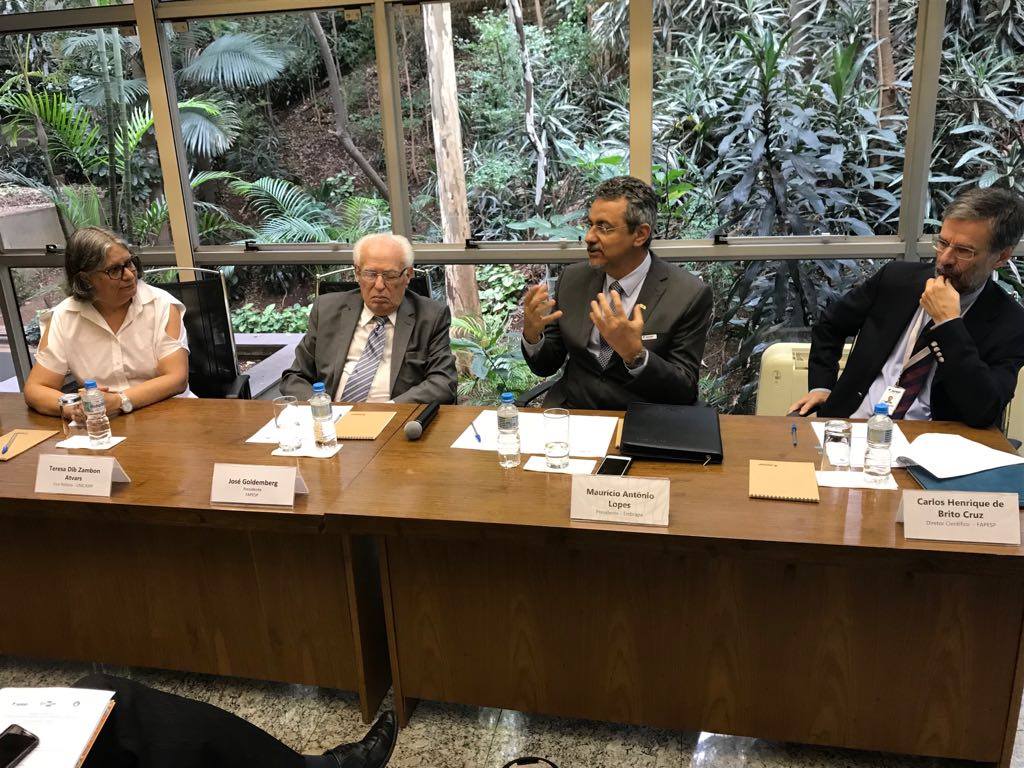Embrapa and Unicamp create climate change research center with Fapesp's support
Embrapa and Unicamp create climate change research center with Fapesp's support
To overcome the challenges climate change poses to agricultural production, Embrapa and the University of Campinas (Unicamp), with support from the São Paulo Research Foundation (Fapesp) have just created the Genomics for Climate Change Research Center – GCCRC.
The Center's mission is to develop biotechnological solutions with the use of genomics, genetics and molecular biology techniques for the adaptation of agricultural crops to high temperatures and water scarcity. The facilities for GCCRC will stem from the expansion of the Mixed Unit for Research in Genomics Applied to Climate Change (UMiP GenClima), to which several Embrapa and Unicamp researchers, analysts, professors and technicians have been assigned.
“If there is an area that is developing quickly, it's this one. And it is important that we become highly competent in the area”, states the president of Fapesp, José Goldemberg. “With Fapesp's collaboration with Embrapa and Unicamp, we can make this project feasible in realistic terms”, he explains. “This engineering center has the mission of not only making high-quality basic research, but also of delivering technology with the potential of being transferred to the production sector”, underscores the Unicamp professor Pablo Arruda, GCCRC's coordinator.
This is a unique opportunity to develop a national platform dedicated to the search for the most advanced knowledge at the frontiers of biology, so that the great effort Brazil requires to adapt its agriculture to the reality of climate change can be achieved, according to Maurício Lopes, president of Embrapa. “We at Embrapa are pleased because this project is going to focus on obtaining knowledge assets. We can use the whole of Embrapa’s network to validate prototypes of biotechnological assets the center is going to generate and also seek support from the productive sectorr”, the president observes.
This will be the largest engineering center that Fapesp is going to have. The signed contract stipulates the amount of R$ 102.8 million throughout ten years, out of which R$ 25.2 million are from Fapesp, R$ 32.9 million from Embrapa and R$ 44.7 million from Unicamp. “We have great expectations about the results this Center is going to bring us”, explained Fapesp's scientific director, Carlos Henrique de Brito Cruz, during the launch ceremony on Wednesday (13), in São Paulo.
The fundamental vision is to establish a research center of international reknown and develop efficient technology transfer, education and dissemination of knowledge. The partnership is going to contribute to the development of tools and biotechnological assets aimed at management towards coping, tolerance and resistance to droughts and to heat among Brazil's main agricultural crops.
“This is the focus of UMip GenClima, but alongside the development of the platform, in the course of 10 years, we will also obtain accessory technologies that could contribute to leveraging new companies and startups, both in the biological/biotechnological sector and in the agricultural one”, emphasizes Cleber Oliveira Soares, director of innovation at Embrapa.
The initiative is based on collaborative research, with financial support through Fapesp's Program of Engineering Research Centers (CPE). Hence it should incorporate a component of collaboration between research and the industry, focused on the use of cutting edge technologies to help Embrapa and private partners bring new biotechnological products to the market. There will also be partnerships with the private sector especially to fund the payment of specialized professionals.
“The skills integration and the multidisciplinary approach required by this project can heavily contribute to the scientific advance of Brazilian agriculture with greater speed. Moreover, the results are going to generate major impact on agricultural research”, asserts Silvia Massruhá, general head of Embrapa Agricultural Informatics. “It is a happy and successful partnership. Thisis going to be the first center created by Fapesp, whose goal is to generate biotechnological solutions for agriculture in light of the impacts of global warming”, celebrates the researcher Eduardo Assad.
UMiP GenClima has been temporarily set up at Unicamp's laboratories, but the expansion project stipulates that GCCRC soon occupies a building of approximately 1.500 m2 of the Laboratory of Biofuel Innovation located at Unicamp's Scientific and Technological Park.
Translation: Mariana Medeiros
Nadir Rodrigues (MTb 26.948/SP)
Embrapa Agricultural Informatics
Press inquiries
informatica-agropecuaria.imprensa@embrapa.br
Phone number: +55 19 3211-5747
Further information on the topic
Citizen Attention Service (SAC)
www.embrapa.br/contact-us/sac/


